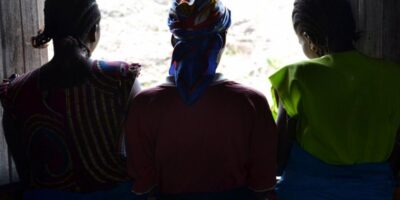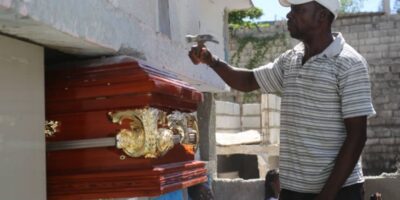In the absence of sex education, young girls think that drinking “ice cold beer with salt” can prevent them from getting pregnant
In 2013, while C. Leriche was in 12th grade at a public school in Port-au-Prince, she became pregnant. The young woman was 18 years old. She decided to have an abortion.
“We were three months away from state exams, she explains. I didn’t want to wait until the next year to take my exams, so I made my decision.”
Leriche approached her older sister’s boyfriend, who was studying medicine at the time. She stayed with him for a few weeks.
“My parents didn’t care about me anymore, she continues. They didn’t care if I went to school or not.”
Like Leriche, Sophie J.B., now 22, experienced a similar episode when she was a schoolgirl. In 11th grade, she became pregnant and had to undergo a medical abortion. In both cases, the process was done in the informal, as abortion is penalized in Haiti.
In most high schools, there is no sex education program.
For example, the only information Sophie has about the voluntary interruption of pregnancy or contraception are dubious techniques that have no scientific guarantee.
“Once I was told to drink an ice cold beer with salt right after the act,” she explains.
According to Jennifer Desroches, a biology teacher for the seventh grade up to the 12th grade, there are several reasons that might push schoolgirls to have an abortion. Mainly despair and the feeling that they have no other choice.
“In Haiti, we make people feel guilty for getting pregnant outside of wedlock. Even adult women are made to feel guilty; we call their children kaka san savon, a youthful mistake, etc. This guilt is extremely difficult for a schoolgirl to bear, even if she is mature and intelligent,” she says.
In our tradition, a child rhymes with the end of studies, and often, these young women from the underprivileged middle classes have only studies as a prospect for the future, according to the teacher.
However, according to Jennifer Desroches, pregnancies in school are not as common as people would like to think. Pregnancies that end in abortion are even less common.
According to the mortality, morbidity and utilizations of services survey (EMMUS-V), sponsored by the Ministry of Public Health (MSPP) and conducted in Haiti from January to June 2012 by the Haitian institute for children (IHE), premature childbearing is three times higher among uneducated girls (27%) than among those with a high school education or higher (9%).
Reginald Eugene, administrator of Collège Étienne Dorelus in Tabarre, seems to confirm that these cases are rare. But it is difficult for him to speak in absolute terms because the students hardly ever talk to the administrative officials.
This mistrust, according to Leriche, is because school officials do not have a trusting or friendly relationship with students. In addition, there is always a fear that schools will turn away pregnant students who may need help.
School officials contacted for this article, however, say that there is no set procedure to follow if the school administration finds out about a pregnancy or abortion.
Alexandre Judes is responsible for discipline at the Collège Théophile Gautier in Tabarre. He believes that it is better that the school administrations are not aware of it.
“This would force us to decide on an arbitrary basis. The Ministry of Education has no provision for these cases. Expelling a student because she has had an abortion does not seem to be an adequate solution, where if the school is not aware of it, life goes on,” he explains.
But for Reginald Eugene, if this is a student whose behavior and performance already placed her on an expulsion list, knowing that she has had an abortion could make it easier for her to be expelled permanently.
“The decision to expel a student is usually not made by one person but after a meeting with a few of the student’s teachers, the administrator, the discipline officer, and the principal. But in an exceptional case like this, the principal may decide not to keep the student,” he says.
Desroches, however warns of the danger of this reason behind expulsion.
“Some schools are run by conservatives who know that abortion is a crime in Haiti, and who don’t hesitate to use morality as a reference to condemn an often desperate act.”
According to Shelo Francois, a psychologist whose work focuses on the use of art as a therapeutic tool, youth pregnancy is socially perceived as a failure, both by the child who becomes pregnant and by the family members who are responsible for raising the child. These young children are under the stress of making a decision for which they may not yet be ready.
“Even before analyzing the school environment in which the child evolves, we must observe the family environment. In many families, childbearing means not only a dismissal, but also the end of childhood for the young girl, who becomes a mother while she is still a child, or a teenager.”
After the abortion, Leriche, now 27, and Sophie J.B. returned to school. It was an unpleasant feeling. “When I went back to class, I felt like everyone could guess what I had done, says Sophie J.B. For a long time, I had olfactory hallucinations. I had the impression that I smelled bad and that it was because of what I had done. So I struggled with intimate hygiene.”
She feared how her friends and family would look at her if the news got out. She would have to face her parents’ disapproval for having a boyfriend while she was still in high school and admit that she had had an abortion through informal means, which could have cost her life.
Although her boyfriend at the time, whom she still dates, stayed with her throughout the ordeal, Sophie admits that six years later, her biggest fear is getting pregnant again. She fears that the abortion may have caused damage to her body that could prevent her from having children.
Post-traumatic stress, according to Shelo Francois, can manifest itself in a variety of ways and affect the academic performance of those returning to school after the abortion.
“The girls may have trouble sleeping, suffer from nightmares, or have hallucinations, like Sophie. Some even go so far as to not set foot in the neighborhood where they had the abortion,” the psychologist continues.
Even in the case of medical termination of pregnancy under suitable conditions, psychological follow-ups must be put in place. “Cases of depression can go very far,” she concludes.
English translation by Didenique Jocelyn and Sarah Jean.







Comments